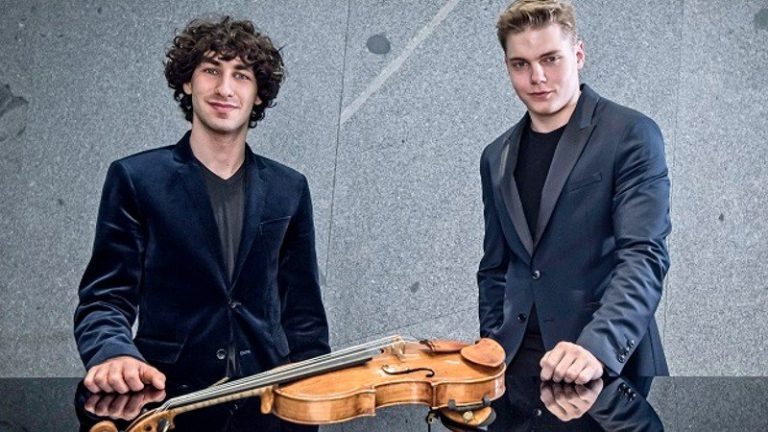German violinist Tassilo Probst and American pianist Maxim Lando, both 20 years old, won in the ICMA Chamber Music category with their CD ‘Into Madness’. Pizzicato’s Remy Franck made the following interview with the two musicians, the youngest ever to win in a category in which the competition is always particularly fierce.
– First, let us talk about your musical origins. Can you share some information about how you both got started in music?
Maxim Lando: My parents are both musicians and run a music school in New York. I spent every day there surrounded by music and musicians from the time I was born, so it was pretty natural that I would either love it or hate it. I loved music right from the beginning and would listen obsessively to various recordings. When I was six years old, the Director of the Jupiter Symphony Chamber Players, a series in New York City where my dad is the regular clarinetist, thought it would be fun to have my dad and I play a Mozart duet together on clarinet and piano (transcribed) for one of the concerts. After this experience I was completely hooked on performing. Over the years I ended up playing regularly with this same chamber music series and I have to credit it for so much of my musical development. Not only did the series give me opportunities to collaborate with incredible top level musicians, but it also specializes in unusual and rarely heard repertoire – filling me with a passion for both chamber music and the discovery of neglected musical gems.
Tassilo Probst: My parents are both nonprofessional musicians, but when I was younger, my father sometimes played the violin at home and every time I sat on the living room carpet and listened to his playing. Something about the sound of this instrument fascinated me so much that at the age of four I asked my parents to buy me a violin too and now, 16 years later, I still think that was one of the best decisions in my life!
– How did you chose your instrument?
ML: I think I fell in love with the violin at the same time as the piano, listening non-stop to especially all the great romantic violin repertoire. I started lessons on both the violin and piano around the same time when I was very young, but I had this idea that I could play Tchaikovsky violin concerto before learning how to play a single scale (or for that matter, even hold the violin properly). Unfortunately, that didn’t work out too well. I sounded like a dying cat and my parents would literally try to hide my violin. The piano came much quicker for me, and soon I fell in love with the limitless repertoire for this instrument as well.
– Could you share a major musical influence or special period of your studies before you both met?
TP: One of my most memorable experiences was certainly my first master class with Zakhar Bron. The incredible intensity of his teaching and his love for details in music revealed to me how much I can actually still achieve. Also, listening to his other students in class showed me what is musically and technically possible on this instrument. That was also the time when I decided to become a professional musician!
ML: Well, for me, the jazz legend Chick Corea has been one of my biggest influences, both musically and personally. When I was 14, I had this fantastic opportunity to play a 3-pianist version of Gershwin’s Rhapsody in Blue with Chick Corea and Lang Lang at Carnegie Hall’s Opening Night Gala. After that performance, Chick and I continued a very special friendship that meant the world to me. He introduced me to new ways of thinking about music, new styles that I had never considered before, improvisation, and the idea that music has absolutely no boundaries.
Lang Lang has been a huge influence in my life. Since I was 11 years old, he has supported me with performance opportunities, mentorship, and generosity. I think he has done more in terms of finding new audiences for classical music than almost anyone in the industry. He has inspired me to find my own path.
Other major influences are my longtime teacher Hung-Kuan Chen, who I think of as my musical partner and soulmate; Daniel Hope, who I have had the privilege of performing together with numerous times and who’s energy and creativity is beyond inspiring; and especially my parents, who always made music fun and introduced me to the joys of chamber music. There have been so many other musical inspirations and fantastic musicians in my life – I’ve just been incredibly lucky!
– So then how did the two of you come together? Munich and New York are not really next door.
ML: Tassilo and I met at the ‘Stars and Rising Stars’ festival in Munich run by Kari Kahl-Wolfsjäger in 2019, where we performed both together and in trio with the wonderful cellist Danjulo Ishizaka.
TP: Yes, and at the first rehearsal Danjulo was a bit late, so just for fun we started playing some duo works and I had the feeling from the first bars that this is something special. It was as if we had been making music together on stage for years, each knowing exactly what the other wanted to do, and even though we had never seen each other before.
ML: And since we really hit it off during rehearsals and the concert, we decided to stay in touch. We had hoped to arrange a few concerts together for the following year but our own individual scheduling got in the way, and then Covid shut the next season down completely. Meanwhile we stayed in contact discussing music and repertoire, and eventually the idea of doing a recording together came up.
– How did the idea of the CD ‘Into Madness’ emerge from your collaboration?
TP: The plan to record such a CD came about in the spring of 2021, and when I thought about the pianist I wanted to record it with, the first name that popped into my head was Maxim. This came as a surprise to many, as we had never played duo concerts before, only a piano trio concert, but I just had a gut feeling that this collaboration could be absolutely great!
ML: I have to give Tassilo the credit completely for making this CD happen. He spearheaded every practical element involved in putting it together! As far as the repertoire, it was very easy to agree. We both loved the idea of presenting something more unusual and less heard. I had recently performed Bartok’s Piano Quintet, which is an important early work of his that is unfortunately rarely played. I had loved the modern romanticism of this early Bartok, so when Tassilo mentioned the early Sonata – I already knew it would be a great match. Tassilo had wanted to record the Enescu after performing it for the Enescu violin competition in Bucharest. This was an extremely easy sell to me, because I fell in love with the improvisatory feel and extraordinary colors immediately. And then there is the Achron – this incredible piece of music for the violin and piano repertoire, a monster piece of repertoire really, that has sat unheard for almost 100 years!!
– Tell us more about the program, especially about the choice of the Achron Sonata.
TP: The first sonata fixed for the CD program was Enescu. I had learned this sonata for the Georges Enescu International Violin Competition in Bucharest, fell in love with this work at the time and really wanted to record it. After that, work began on finding other sonatas that would fit Enescu’s Eastern European folk music style.
We tried to find more unknown sonatas, as it just always excites me to dig up new works and present them to the public, and fortunately I stumbled upon this incredible early romantic work by Bela Bartok, and after another while of research I found out that in the archives of Universal Editions there was this still unreleased Achron Sonata, never recorded before. So I called Universal Editions and a few nice phone calls later, they printed the sheet music for us!
ML: The concept of our title ‘Into Madness’ came while we were rehearsing in New York and recording in Germany. We felt a bit of madness (in the very best sense possible) in each of the pieces, but our arrival point was the Achron Sonata. Honestly we went a bit „mad” working on it, but we were incredibly happy with the results. The music is intense and probing. Often the independent lines between the two instruments feel almost contradictory but then somehow they take on this higher meaning together, and the tonal/harmonic language feels completely unique. The more we explored this Sonata, the more we realized it is a complete masterpiece. It was extremely exciting!
– Your playing on the CD is obviously very harmonious, highly expressive. What is, according to you, the main element which characterizes your duo?
ML: Well, I think we are both passionate and intense people by nature. Definitely we are both adrenaline junkies, and I think we feel an energy playing together that propels us to play off each other. The driving force is just the desire to make some great music happen.
TP: The special thing about Maxim and me is that we never have to do anything extra. Whenever we make music together, everything comes naturally, most of the time we don’t have to discuss anything at all, because for some reason we know how the other wants to shape the music and then respond to it while playing. We are both very spontaneous musicians, during the recordings no take was like the other, but still we were always perfectly together, because we know or feel, what the other one wants to do.
– What is driving you, when you play?
TP: When we practice, of course everything has to fit 100%, every rhythm, every dynamic, every instruction of the composer. But when you go on stage, in my opinion, the most important thing is not to think about all these things anymore, but to just let go and to feel the flow of the music.
– Your CD got excellent reviews and now you win the ICMA Award in Chamber Music, a category where many productions with very well established and renowned artists were competing. And then you won with your debut CD, being among the youngest awardees ever in an ICMA audio category. What does this mean to you?
ML: It is a huge honor for sure, and we are both beyond thrilled and excited to see the CD being received this way! It would be an amazing bonus to see our generation or the next generation beginning to program and perform the Achron over the next decade. The visibility of the ICMA award could make that dream a real possibility!
TP: When we recorded this CD, none of us thought, that two 20 year old musicians could achieve such amazing reviews and awards with their debut CD, even more so, with this rather unusual repertoire. But this point is very nice to see that not only CD´s of big stars with all the standard repertoire can get attention, but also such musical delicacies like “Into Madness”.
– Do you have plans for a next CD?
ML: We have definitely been talking about a next CD, but not sure yet exactly what that might involve. Hopefully we will have more news soon!
TP: My next CD will be a solo CD with yet another premiere recording by Joseph Achron. And, like Maxim said, there are already some plans for further projects with Maxim!











